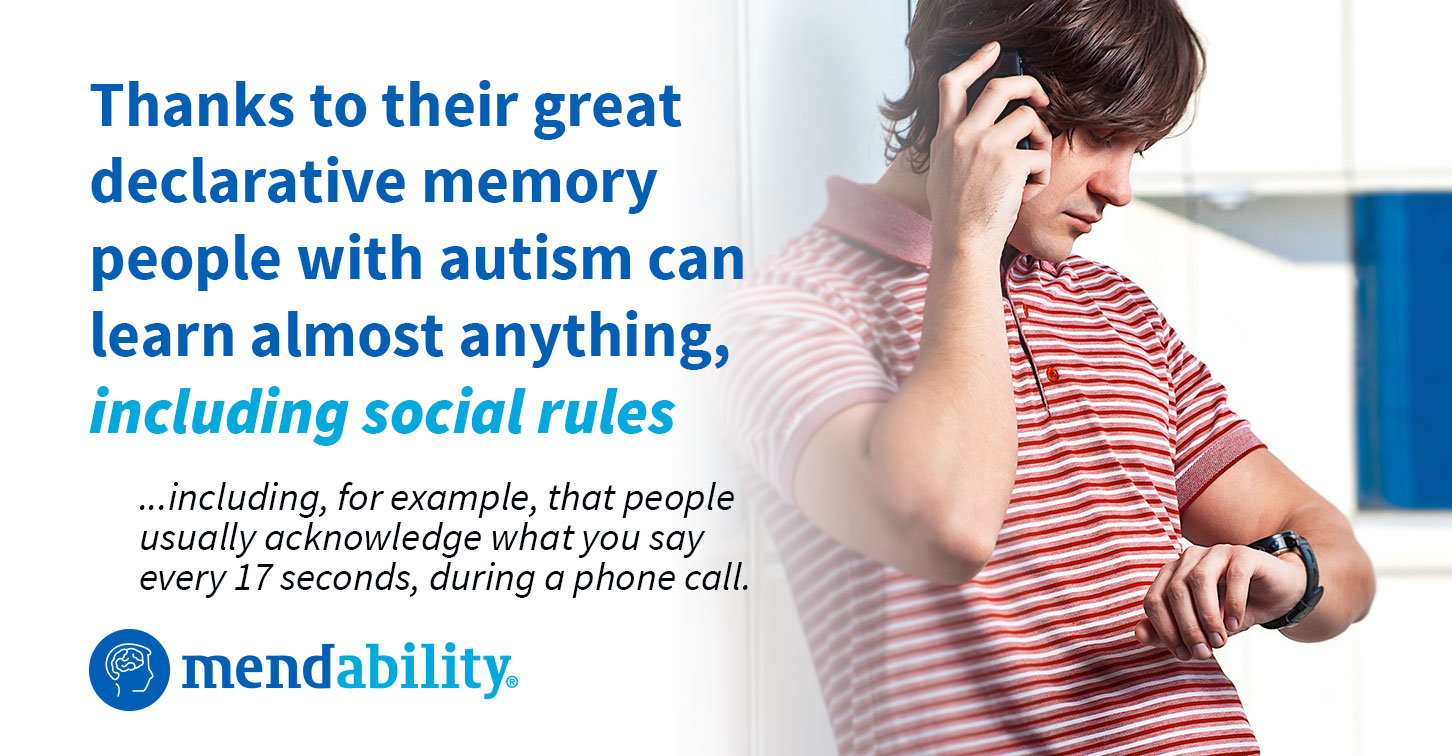A recent paper published by the Simon Foundation for Autism Research Initiative reviews research on declarative memory and considers the possibility for declarative memory to compensate for emotional and social deficits in autism.
Declarative memory allows us to link past information to new information in order to create useful combinations. Declarative memory is anchored in visual and auditory learning and storing, and is used for keeping track of names associated with faces and situations, for example.
Many individuals with autism show a remarkable capacity to store specific information. Some children can repeat an entire dialogue, sometimes with the “voices”, and yet they are unable to express a personal need with rudimentary words.
Some exceptional high-functioning autistic teenagers or young adults are able to connect dates and events to the smallest amount of information or give perfect itineraries from a place to another simply by scanning maps for a few seconds.
At first glance these savant skills do not appear to contribute to a happy and balanced social life; however, they can be utilized to compensate for deficits through the instruction of explicit rules or principles of social interactions or scenarios.

For example, a French gentleman with Asperger’s explains that he had to learn and apply social rules in phone conversations. He noted that during a phone conversation, the listener makes a sound of acknowledgment every 17 seconds. Because he is not compelled to respond spontaneously during a conversation, he applied this learned rule and, holding his watch in front of his eyes, he would say “ahuh” (or another conventional French agreement sound) every 17 seconds.
This very simple change made social interaction on the phone easier for the caller. Although the gentleman’s symptoms did not directly improve, his improved ability to connect with others impacts his quality of life by reducing social isolation.
Dr. Temple Grandin regularly emphasizes that parents must teach social etiquette to their children with autism. Politeness is a dimension of social interaction which is important to reduce tension in human relationships.
It is certainly possible to teach a child or adult with autism the social rules which are expected and desirable. However, for social rules and interaction to become spontaneous and enjoyable, it is important to improve a person’s self-awareness and the perception of others.
If an individual with autism is unable to translate a facial expression, it will be impossible for him or her to implement the proper social response to the anger, surprise, or sadness of others.
Sensory Enrichment Therapy helps autistic people of all ages to develop self-awareness with exercises leading the brain to have a strong and valid perception of the body, posture, movement. Other exercises will help develop a sense of comfort with social cues by improving the perception and translation of body language. Sensory Enrichment Therapy can also improve sensory integration, which assists with social skills by reducing the “noise” so individuals can make better sense of his or her environment and gain interest in the people around them.
Did you know that individuals with autism are missing specific connections in their brain to recognize the meaning of facial expressions, and even, to recognize the faces of familiar people? For this deficit, Mendability prescribes daily exercises to build connections and improve the biochemistry of the brain that fuels the sensory translations.
References
- Ullman MT, Pullman MY. A compensatory role for declarative memory in
neurodevelopmental disorders. Neurosci Biobehav Rev. 2015 Apr;51:205-222. doi:
10.1016/j.neubiorev.2015.01.008. Epub 2015 Jan 15. Review. PubMed PMID: 25597655;
PubMed Central PMCID: PMC4359651. - Baron-Cohen S, Ring HA, Wheelwright S, Bullmore ET, Brammer MJ, Simmons A, Williams SC. Social intelligence in the normal and autistic brain: an fMRI study.
Eur J Neurosci. 1999 Jun;11(6):1891-8. PubMed PMID: 10336657. - Daly EM, Deeley Q, Ecker C, Craig M, Hallahan B, Murphy C, Johnston P, Spain
D, Gillan N, Brammer M, Giampietro V, Lamar M, Page L, Toal F, Cleare A,
Surguladze S, Murphy DG. Serotonin and the neural processing of facial emotions
in adults with autism: an fMRI study using acute tryptophan depletion. Arch Gen
Psychiatry. 2012 Oct;69(10):1003-13. PubMed PMID: 22638012.

